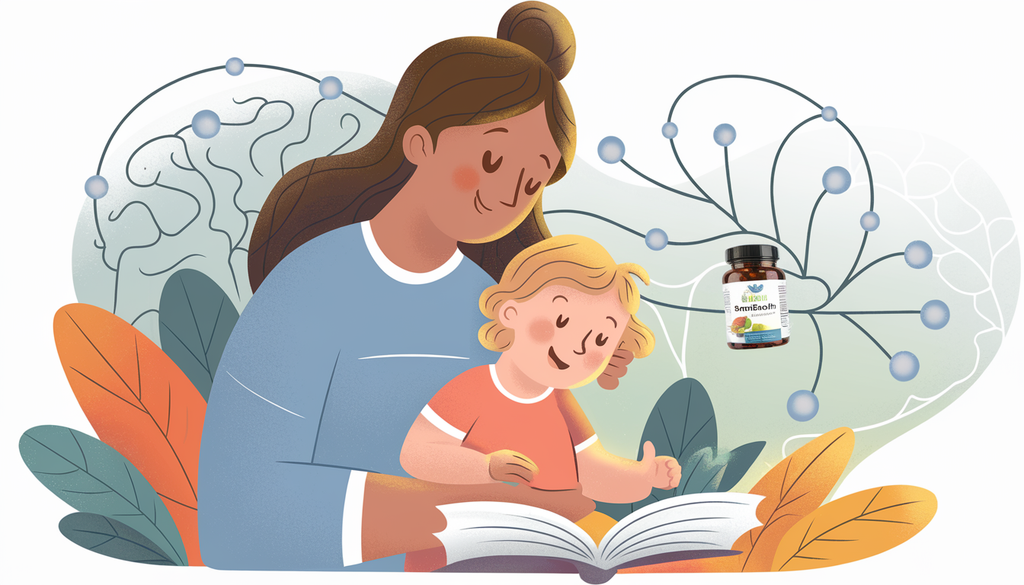
Nutrition plays an important role in the growth and health of children, especially those with sensory needs. One key nutrient that stands out is folic acid, which is needed for brain growth and overall health. In this article, we will explore folic acid benefits, the differences between folinic acid vs folic acid, and how to add folic acid supplements to your kid's meals to support their sensory needs.
What is Folic Acid?
Folic acid is a type of B vitamin that is important for the body. It helps make DNA and RNA and is important for cell division. This nutrient is especially important during times of fast growth, like pregnancy and early childhood.
During pregnancy, folic acid helps prevent birth defects in unborn babies. For children, it helps brain growth and overall health. Folic acid helps make new cells and is important for brain function and emotional well-being.
Folic Acid Benefits for Children with Sensory Needs
Folic acid plays an important role in brain development and overall health, making it especially beneficial for kids with sensory needs. Here are some main folic acid benefits:
- Brain Development: Folic acid helps make neurotransmitters, which are important for brain cell communication.
- Cognitive Function: Enough folic acid can help improve brain functions like memory, focus, and problem-solving.
- Mood Regulation: Folic acid helps make serotonin, a brain chemical that helps control mood.
To learn more about the history of folic acid, read Folic Acid Food Fortification—Its History and Effects.
Folinic Acid vs. Folic Acid
Folinic acid and folic acid are both forms of vitamin B9, but they have some differences:
- Folic Acid: This is the synthetic form of vitamin B9, commonly found in supplements and fortified foods.
- Folinic Acid: This is a naturally occurring form of vitamin B9 that the body can use more directly.
Folinic acid offers several benefits, especially for children with sensory needs:
- Better Absorption: Some children may have difficulty converting folic acid into its active form. Folinic acid bypasses this step, making it easier for the body to use.
- Enhanced Brain Function: Folinic acid can support brain function more effectively in some children, improving cognitive and emotional well-being.
Understanding the differences between folic acid and folinic acid can help you make informed choices about your child's nutritional needs, particularly when considering folic acid supplementation.
Folate Supplement: Natural Sources and Supplementation
Ensuring your child gets enough folate is crucial for their development, especially if they have sensory needs. Here are some natural food sources rich in folate:
- Leafy greens like spinach and kale
- Citrus fruits such as oranges and lemons
- Beans and legumes like lentils and and seeds
- Avocados
- Broccoli
- Nuts and seeds
- Eggs
For more practical dietary advice, check out 15 Healthy Foods That Are High in Folate (Folic Acid).
While natural sources are great, sometimes it's challenging to ensure your child gets enough folate from diet alone. This is where a folate supplement can be beneficial, especially for children with sensory needs. Supplements can help fill nutritional gaps and support overall wellness. Consider incorporating foods high in folic acid as well to maximize folate benefits.
When choosing a folate supplement, consider the following:
- Look for third-party tested products to ensure quality and safety.
- Opt for supplements free from additives and artificial ingredients.
- Choose products that are easy to incorporate into your child's diet, like unflavored dissolvable powders.
How to Incorporate Folic Acid into Your Child's Diet
Incorporating folic acid-rich foods into your child's diet doesn't have to be difficult. Here are some practical tips for including foods high in folic acid:
- Include leafy greens in smoothies or as part of meals.
- Add beans and legumes to soups, stews, and salads.
- Offer citrus fruits as snacks or in fruit salads.
- Incorporate avocados into sandwiches, salads, or as a side dish.
- Use broccoli as a side dish or in casseroles and stir-fries.
- Include nuts and seeds in snacks or as toppings for yogurt and oatmeal.
- Add eggs to breakfast dishes or as a protein source in meals.
To ensure your child gets enough folic acid, consider using folic acid supplements. Simple Spectrum offers high-quality, third-party-tested supplements designed for children with sensory needs. Their unflavored dissolvable powder is easy to add to your child's meals and is free from gluten, casein, and GMOs.
For more information on Simple Spectrum's commitment to quality and their range of products, visit their website.
Conclusion and Call to Action
Ensuring your child receives enough folic acid can be achieved through a balanced diet rich in folate or by incorporating high-quality supplements. Simple Spectrum is dedicated to providing top-tier, third-party-tested supplements to support your child's nutritional needs. Consider exploring Simple Spectrum's Nutritional Support Supplement and Omega 3 DHA Supplement to enhance your child's diet and support their sensory needs.
